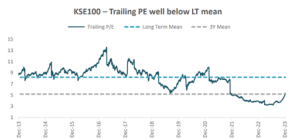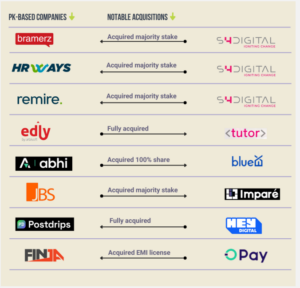Introduction
In our last blog post, we explored the prospects of the startup ecosystem following the February 8th elections. Since then, significant news has emerged with Turkish fintech powerhouse Papara’s acquisition of SadaPay, a prominent fintech company in Pakistan. Although details of the acquisition remain undisclosed, reports suggest the all-stock deal is valued between $30 million and $50 million.
M&A Activity in 2024
This deal marks the first significant M&A activity for 2024, following a relatively quiet year in 2023. Global M&A activity experienced a decline last year, with a 14% decrease in deal volume and a 41% drop in deal value. Similarly, Pakistan saw a total of 8 notable M&A transactions in 2023 involving both local and international entities, marking a 20% decrease compared to 2022. Significant M&A deals in 2023 included Abhi’s acquisition of 2.7 million shares in the logistics company BlueEx and Opay’s acquisition of the EMI license of Finja.
Reasons for Subdued M&A Activity
Global Trends
Following the substantial dealmaking activity of 2021 and early 2022, both private equity and venture capital sectors have seen significant declines in deal activity. Rising interest rates, a lack of financing, and widespread economic uncertainties have contributed to this downtrend. Additionally, existing investments have faced sharp devaluations, resulting in down rounds for VC-backed companies.
Domestic Market Reflections
The domestic market mirrors these global trends, with interest rates reaching an all-time high of 22%. Inflation, at approximately 30% in 2023, has significantly impacted the economy. Furthermore, the sharp devaluation of the rupee and the foreign exchange liquidity crisis have undermined investor confidence. Listed equity valuations are trading at a discount despite substantial earnings, primarily due to macroeconomic uncertainty.

Drivers of M&A Activity
Challenging Fundraising Environment
The current fundraising environment is challenging. Numerous startups are depleting their cash reserves with slim prospects for additional injections. Seed-stage startups in Pakistan often secure funding through SAFEs, but transitioning to priced rounds will encounter heightened scrutiny and extended lead times before funds are disbursed. This raises the question of how long current reserves can sustain these businesses.
Acquisition as a Viable Option
At this juncture, businesses with relatively sustainable models or those nearing sustainability may find acquisition a viable option. From an acquirer’s perspective, current valuations are appealing as the trend of down rounds persists. This allows acquirers to purchase startups at reasonable or discounted prices. Moreover, once the anticipated broader macro correction occurs, valuations are likely to rebound.
Domestic Conglomerates
While many look outward for potential acquirers, domestic conglomerates are also promising candidates for acquisitions in the local startup market. With robust corporate profitability in 2023, entities in banking, energy, and consumer goods sectors have surplus liquidity. Some already have existing investments within the ecosystem. Alternatively, some corporate entities may prefer a “dip-toe” strategy, initially acquiring a smaller stake and gradually increasing it over time, eventually leading to a full acquisition.
For instance, Bank Alfalah has ventured into the venture capital ecosystem by acquiring a 7.2% equity stake valued at PKR 140 million (USD 0.5 million) in the startup QistBazaar, a licensed Buy Now Pay Later (BNPL) non-bank financial company (NBFC) regulated by the Securities and Exchange Commission of Pakistan (SECP). Such transactions enable startups to extend their runway by securing additional funding while providing investing companies the opportunity to assess the startup’s prospects before making a significant financial commitment.
Looking Beyond
Consolidation and Growth
Consolidation through M&A activities indicates a maturing and vibrant ecosystem. The resulting synergies and access to capital can greatly propel the growth aspirations of local startups. Additionally, increased M&A activity can benefit foreign players seeking entry into the Pakistani market.
Exploring New Sectors
Local acquirers have the chance to venture into new sectors or gain access to cutting-edge technology stacks through startup acquisitions. This is particularly relevant in the FinTech sector, where the market is saturated with both legacy players and emerging startups.
Sustainability as a Central Theme
While M&A deal activity is expected to persist throughout the year, the central theme will revolve around the sustainability of businesses. Potential acquisition targets must demonstrate a viable path to profitability backed by positive unit economics.

